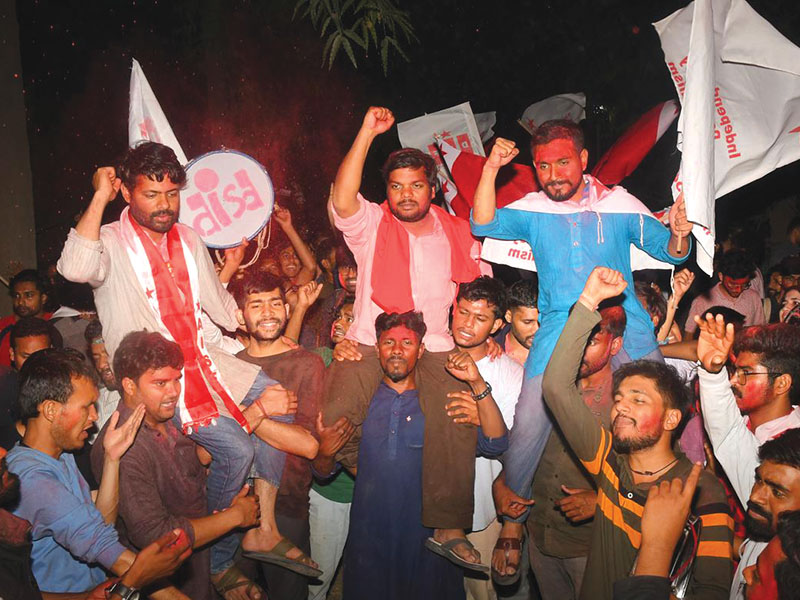Autar Nehru (Delhi)
Newly elected JNUSU president Dhananjay (centre) & supporters
Living up to its reputation of being a bastion of woke Left politics, a students’ coalition of organisations affiliated with mainstream Left parties — AISF (affiliated with CPI), SFI (CPI-M), AISA (Communist Party Marxist Leninist) and DSF (independent Left) backed by BAPSA (a Dalit Ambedkarite organisation) — swept the Jawaharlal Nehru University Students’ Union (JNUSU) elections held on March 22 after a hiatus of four years.
The posts of president, vice-president, general secretary and joint secretary in the JNUSU governing council were all bagged by the United Left coalition. A total of 5,050 students who voted this year (73 percent of 7,700 eligible to vote) gave the United Left a clear majority against its main rival Akhil Bharatiya Vidyarthi Parishad (ABVP) affiliated with the BJP which rules at the Centre and in several states and is widely predicted to sweep General Election 2024 scheduled for next month.
Dhananjay, a doctoral student of theatre and performance studies (sic) of AISA, was elected JNUSU president with 2,598 votes defeating nearest rival ABVP’s Umesh C. Ajmeera (1,676). The votes polled by the presidential candidate of the Congress party-affiliated NSUI aggregated a mere 283 (against 700 in 2019). A Congress party spokesperson attributed its low vote share to “half-hearted campaigning” to support the United Left.
The defeat of ABVP which was fully backed by the BJP, has sparked a ray of hope in the opposition INDIA (Indian National Developmental Inclusive Alliance) — a coalition of 40 — opposition parties cobbled together in 2023 to ensure that the ruling BJP is not re-elected for a third time in General Election 2024. They hope that the JNUSU election result will be replicated on the wider canvas. In a post on X, Samajwadi Party president Akhilesh Yadav observed: “The PDA unity has collectively won all important posts in the JNUSU elections and defeated the BJP-backed ABVP by a huge margin.” PDA is a Hindi language acronym coined by the SP leader to represent pichhde (backward classes), Dalit and alpsankhyak (minorities).
Although most political observers dismiss such speculation as wishful thinking, there’s no gainsaying that JNU (estb.1969) is a big prize and status symbol. Spread over 1,019 acres in the heart of Delhi, it has an annual budget of Rs.200 crore, hosts 8,800 students including 4,300 doctoral (Ph D) students in its 20 schools and specialist academic centres. International university ranking agencies including QS and THE routinely rank it among Asia’s Top 100 universities. In the EducationWorld India Higher Education Rankings 2023-24, JNU is ranked #3 nationally and under the Union education ministry’s NIRF, it’s #2.
Unsurprisingly, control and command of JNU and JNUSU is a high priority for the BJP leadership and its ideological mentor organisation Rashtriya Swayamsevak Sangh (RSS), particularly because intensely debated social issues such as minority rights, feminism and socio-economic justice are anathema to it. Therefore, JNUSU elections are fiercely contested by its proxy ABVP. However thus far, ABVP has failed to fulfill this wish of its parent organisations.
Nevertheless, following its sweeping victory in the general elections of 2014 and 2019, BJP has brought this Left bastion to heel by other means. In 2016, Mamdalla Jagdesh Kumar, an obscure academic from IIT-Delhi, was appointed vice chancellor and served a six-year term during which he often cracked down on JNUSU activists for “anti-national” activities. For his tough stand against JNUSU lefties, in February 2022, Prof. Jagdesh was elevated to the chairmanship of the apex-level University Grants Commission. Subsequently, Dr. Santishree Dhulipudi Pandit, former professor of political science at Savitribai Phule University, Pune and reportedly an RSS/BJP “sympathiser”, was appointed JNU vice chancellor in 2022.
“It’s pertinent to note that in the recent JNUSU election, ABVP’s vote share has improved substantially. It’s only a matter of time when it will win,” says Makarand Paranjape, former professor of English at JNU. “As for the impact of JNUSU election result on General Election 2024, it will be nil,” he adds.
The chances of the good professor being right are very high.
